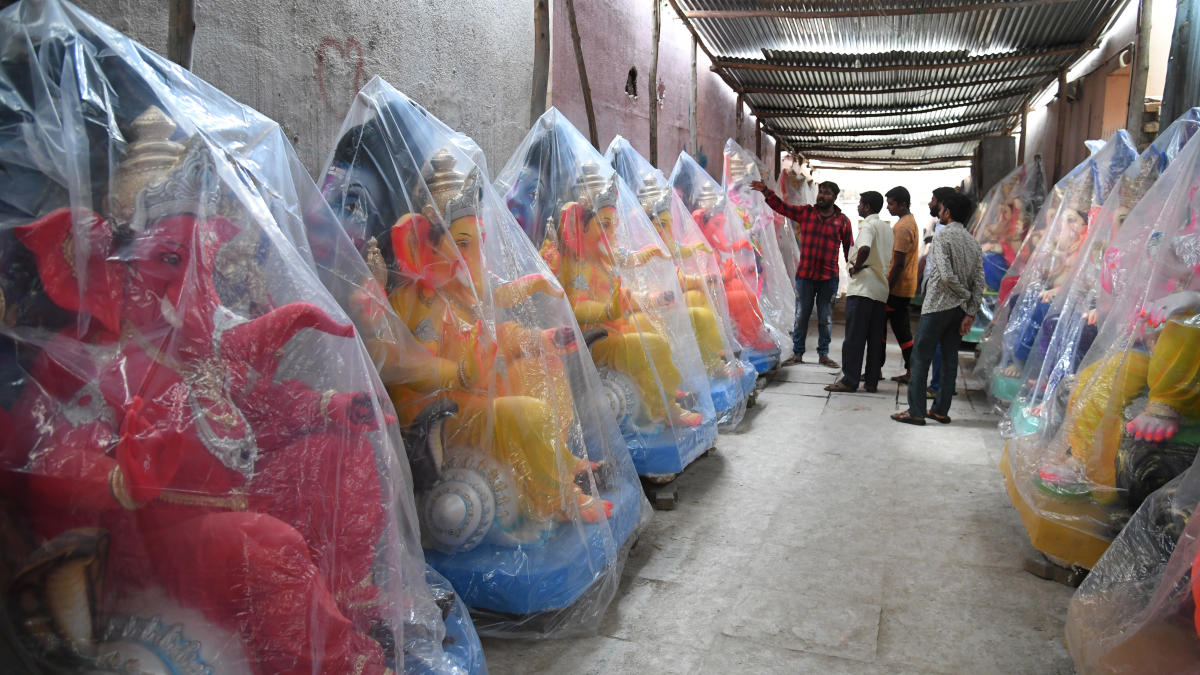The Karnataka High Court has issued a powerful statement, laden with sentimental urgency, calling upon state authorities to execute seven pivotal actions in enforcing the government’s ban on Plaster of Paris (PoP) idols. The bench underscored that the government’s directive—prohibiting the manufacture, sale, storage, and immersion of Ganesha and Gowri idols made from PoP—is not to be treated as a mere advisory, but as binding law that demands complete compliance. This ruling comes ahead of the upcoming Gowri and Ganesha festivals, during which eco-friendly practices are critical to preserving the state’s water bodies and environmental health.
The court’s message carries a deep emotional appeal, emphasizing the spiritual significance of Ganesh and Gowri festivals while simultaneously highlighting the damaging environmental toll of PoP idols—packed with toxic elements like lead, mercury, and cadmium—that dissolve in water and harm aquatic ecosystems. The court rebuked lax enforcement, noting that despite clear government orders and multiple circulars, violations persist. These include unrestrained PoP idol manufacturing, transport, and sale, even storage in parts of Bengaluru and other districts, prompting concern over public apathy and official inaction
Pushing for change, the High Court called for an unprecedented six-week intensive enforcement plan. State departments—from the Karnataka State Pollution Control Board (KSPCB) to local municipal bodies—must mount raids, seize PoP idols, register criminal cases where needed, and ensure the destruction of illegal stocks. The government has already issued the ban and reinforced it through orders in 2023–24—but the court declared that now is the critical moment for authorities to act decisively and unify their approach to preserve both faith and environment.
The High Court’s renewed emphasis on implementing the PoP idol ban has stirred discussions across Karnataka, with environmentalists praising the judiciary for prioritising ecological concerns over convenience. Several green groups have pointed out that past attempts to enforce the ban often faltered due to lack of coordination between government departments, allowing illegal manufacturing to continue almost openly. They believe the court’s strong words will compel local bodies and police to act decisively this year. Some activists are even pushing for real-time public dashboards to track seizures, raids, and awareness drives, so that citizens can monitor compliance and hold authorities accountable.
For idol makers dependent on PoP, however, the ban poses significant economic challenges. Many artisans argue that while eco-friendly clay alternatives exist, they are costlier, harder to work with, and in short supply during peak season. PoP idols, in contrast, are lighter, cheaper, and quicker to produce, making them more profitable for both producers and sellers. The shift to clay requires training, investment, and a change in customer mindset—elements that they say cannot be achieved overnight. Some artisan groups have requested government subsidies and skill development workshops to ease the transition.
On the public front, responses remain mixed. Urban residents, particularly in Bengaluru, have shown increasing awareness about eco-friendly practices, with many households and apartment associations already opting for clay idols in recent years. Rural areas, however, face more resistance due to deep-rooted traditions and limited access to alternative idols. Religious leaders have stepped in to reassure devotees that worship with clay idols holds the same spiritual significance, aiming to bridge the gap between tradition and sustainability.
Politically, the ban’s enforcement has also become a talking point. Opposition parties have accused the ruling government of historically failing to act on environmental laws until the courts intervened. They argue that the annual scramble to ban PoP idols exposes the administration’s reactive approach. The government, on its part, has countered by highlighting past raids, public campaigns, and financial aid to artisans switching to eco-friendly production. Both sides are attempting to position themselves as defenders of both faith and environment, aware that the upcoming festivals carry significant public attention.
Municipal bodies now face the logistical challenge of seizing idols already in circulation. In many cases, PoP idols are brought in from outside Karnataka, requiring cooperation with neighbouring states to prevent cross-border transportation. Border checkpoints, special inspection squads, and surprise raids at wholesale markets are being planned to curb illegal movement. However, enforcement officials admit that complete control is difficult, as small-scale vendors often operate informally and relocate frequently to avoid detection.
The role of the Karnataka State Pollution Control Board (KSPCB) is under particular scrutiny. The court has directed it to step up monitoring of immersion points during the festival, ensuring that no PoP idols are allowed into lakes, rivers, or reservoirs. This will require deploying additional manpower, setting up barricades, and working alongside volunteers to check every idol before immersion. Environmental groups have suggested installing temporary idol-washing stations for devotees to clean their clay idols after the festival, ensuring no contamination enters water bodies.
Awareness campaigns are also set to intensify in the coming weeks. Radio ads, street plays, school workshops, and temple announcements will spread the message of the ban and the environmental dangers of PoP. Several NGOs have proposed distributing small clay idols for free in low-income areas to encourage a shift in tradition. Officials hope that positive reinforcement, rather than penalties alone, will help create lasting behavioural change and reduce demand for banned materials over time.
Subheading: Enforcement Gaps Exposed
Beneath the court’s firm directives lies clear dismay over the implementation gap. Despite the 2023–2024 government orders banning PoP idols, authorities have conducted raids in only a few zones—Bengaluru’s Dasarahalli and Hubballi—with seizure numbers surprisingly low (around 1,000 idols and 180 idols, respectively). The court observed that such isolated actions amount to tokenism, particularly troubling given the festivals are imminent and time for corrective action is limited
Worse still, illegal PoP idol units remain active in several regions, with reports revealing at least nine production sites still operating in violation of the ban. Activists and residents have filed numerous complaints to KSPCB, yet enforcement remains intermittent and insufficient. These oversights contributed to nearly 7.5% of immersed idols still being PoP in 2022—a troubling statistic that the court and environmentalists warn could increase if frantic pre-festival sales continue unchecked.


Administrative Orders vs On-ground Realities
In direct response to the court’s concerns, the Karnataka Forest, Ecology, and Environment Minister reaffirmed—in a strongly worded directive—the government’s commitment to the ban. Authorities were instructed to collaborate closely with welfare associations, residential complexes, and community groups to shift towards eco-friendly alternatives. The minister cautioned against chemical-laden idols and stressed that local bodies must orchestrate robust awareness campaigns to reinforce both environmental stewardship and public health
Yet, the High Court noted that directives alone are insufficient—enforcement must be visible, tangible, and relentless. The court urged municipalities and law enforcement agencies to establish checkpoints, deploy surveillance where idols are produced or sold, and ensure that seized idols are disposed of scientifically, rather than recycled or returned. The court explicitly warned that inaction or reluctance could warrant legal consequences for responsible officials and be treated as contempt of court.
By demanding that state authorities implement the government’s PoP idol ban with utmost seriousness, the Karnataka High Court has juxtaposed tradition with environmental responsibility, urging that true faith honors the planet. The demand is not merely procedural—it is overdue. At stake are Karnataka’s rivers, lakes, and public health—threatened not by ritual, but by harmful plastics and toxic chemicals embedded in PoP idols that dissolve into water. The court’s ruling carries not just legal significance, but a moral imperative, reaching into courtrooms, masjids, homes, and hearts across the state.
As the Gowri and Ganesha festivals approach, Karnataka’s response now will set a precedent: either a demonstration of renewed faith aligned with ecological harmony—or a cascade of violations under the guise of festivity. The onus is on the authorities: to translate bans into action, awareness into accountability, and circulars into closure of illegal operations. Only then can Karnataka celebrate festivals that truly reflect the spirit of reverence, without sacrificing its natural heritage. The court’s call is clear: tradition must not drown the environment—but in Karnataka’s green turn, both can—and must—coexist.
Religious and cultural organisations have an important role in shaping public opinion. Some Ganesh Utsav committees in Bengaluru have already declared their commitment to 100% eco-friendly idols this year, setting examples for others to follow. They argue that spirituality should align with stewardship of nature, and that adapting traditions to protect the environment is itself an act of devotion. These statements have been welcomed by environmentalists as a sign that faith-based leadership can be a powerful ally in policy enforcement.
Yet, doubts remain about whether enforcement will be as “serious” as the High Court expects. In previous years, initial crackdowns often fizzled out as festivals approached, with authorities citing manpower shortages and public resistance. Critics warn that without continuous monitoring right up to immersion day, illegal sales could still flourish in hidden markets. The court’s warning about contempt proceedings may serve as a deterrent, but much will depend on the willingness of officials to prioritise environmental protection over political and social convenience.
Ultimately, the High Court’s order is more than a directive—it is a test of Karnataka’s ability to balance tradition, livelihood, and ecology. The coming weeks will reveal whether the state can set a precedent for sustainable celebrations or fall back into the cycle of partial enforcement. If implemented effectively, the ban could become a model for other states grappling with similar challenges. If not, it risks becoming another case of well-intentioned law undermined by poor execution and cultural inertia.
Follow: Karnataka Government
Also read: Home | Channel 6 Network – Latest News, Breaking Updates: Politics, Business, Tech & More


